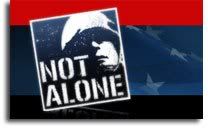Thanksgiving, From the Frontline to the Homefront and Back Again
 Happy Thanksgiving.
Happy Thanksgiving.
How is your holiday shaping up? I hope that you and yours are on your way to building a memorable one. Before moving into the heart of this post, I'd like to take a moment to personally thank the family that I'm blessed to have, who offer me the support and encouragement to continue plugging away.
This work means a lot to me, as do my studies; but, both of these endeavors take enormous amounts of time away from those that love me and that I love in return. So, I thank them for being there for me, nonetheless, through it all.
While certainly on a larger scale and scope magnitude, deployed troops also give up a lot to accomplish their goals and achieve their mission. Their families also give up one of the most valuable and perishable commodities we have in life: time with those we love the most.
This Thanksgiving, I wish you all the best -- ample hours with family and the very best of friends; a good meal; moments to relax or to kick things up if you prefer; and the grace to reflect, no matter the present appearance, on the many things we all have to be thankful for.
Gratitude is not only the greatest of virtues, but the parent of all the others. -- Cicero (106-43BCE), Rome
In extended, I've collected a few reflective stops on the media landscape, as well as a few video 'shoutouts' from troops serving overseas to loved ones back home. Let's keep them all in our thoughts, as always, and recommit to extending ourselves to the families who await their return. Happy Thanksgiving, dear readers and friends.


 A head's up: Give today's NPR's
A head's up: Give today's NPR's 
 For condolences, an
For condolences, an 


